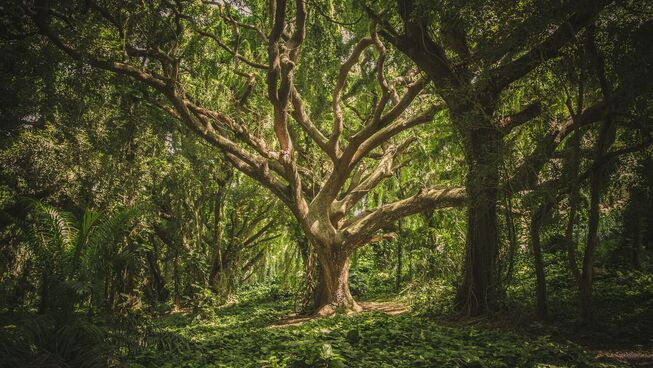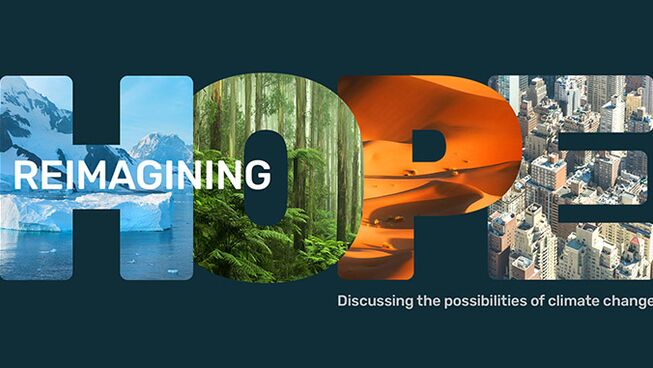What is the right relationship with the environment?
Forests almost feel spiritual - but does this reveal something bigger? A practical conversation which is sure to change the way you appreciate Melbourne's natural environment and perhaps find something more.
Our guest is Dr. Kathryn Williams. Kath is Associate Professor in environmental psychology at the University of Melbourne. Her research is grounded in partnerships with environmental agencies concerned with forest management and urban greening. She is editor for Forestry: An International Journal of Forest Research and lives in Melbourne’s inner north.
This conversation was recorded in partnership with St Augustine's Anglican Church in Moreland.
Help us keep asking Bigger Questions. Support the show for as little as US$1 per podcast on Patreon.
Bigger questions asked in the conversation
So Kath - you work in environmental psychology, you’re the editor for a journal on forest research but you live and work in inner city Melbourne. Does this cause you frustration?
You love the environment though? Going for a bushwalk?
Smaller Questions
So Kath our smaller questions to you are about forests and human wellbeing.
Kath’s research
So Kath, you work as an environmental psychologist and part of your work considers the psychological benefits of nature experience. What made you interested in researching forests and our natural environment?
Now you even went and lived in a forest area in Gippsland. So how was that experience?
And this formed the basis for your PhD research? Can you tell us about that?
There was conflict in understanding environmental issues in this area. So what did you do? What did you find?
In what way do people understand this spiritual connection?
What do you make of this spiritual sense of connection with nature?
Do you think that the environment can serve as a spiritual end? Like worshipping mother nature?
Kath’s story
So Kath, you’re a Christian believer, tell us your story. You grew up going to church. What was that like?
There were several influences in your life and faith weren’t there?
But in your early 30’s though - you weren’t quite sure if you fitted in the Christian faith?
What made you stay in the faith?
So you discovered that people committed to environmental care can be Christians?
Do you think Jesus would have a compost bin?
Does your relationship with God enhance or threaten your idea of the environment?
The Bible’s answer - right place - Psalm 104
Today’s big question is ‘What is the right relationship with the environment’ and perhaps surprisingly the Bible helps us answer this big question.
The Old Testament book of Psalms, was a bit like the song book for the Ancient people of Israel. Psalm, or Song, 104 is a creation Psalm which outlines an interpretation of the voices of the various components of God’s creation. And verses 16-18 says,
The trees of the Lord are watered abundantly,
the cedars of Lebanon that he planted.
17 In them the birds build their nests;
the stork has its home in the fir trees.
18 The high mountains are for the wild goats;
the rocks are a refuge for the coneys.
So how does someone passionate about forests react to this description about the trees of the Lord being watered abundantly and the cedars of Lebanon?
What does this passage say about environmental flourishing?
Psalm 104 says,
You cause the grass to grow for the cattle,
and plants for people to use,
to bring forth food from the earth,
15 and wine to gladden the human heart,
oil to make the face shine,
and bread to strengthen the human heart.
What is the significance of this?
The overall message of Psalm 104 is summarised in verse 24 which says,
O Lord, how manifold are your works!
In wisdom you have made them all;
the earth is full of your creatures.
The author of the Message version of the Bible, Eugene Peterson, is also a keen environmentalist and draws a distinction between caring for the environment and caring for creation. Do you think that is significant?
Many Christians have thought about the idea of exploitation of the natural world from Genesis 1 which talks about humanity having dominion over the natural creations - but that’s not quite how you see it?
So would you see the concept of what dominion looks like informed by passages like this from Psalm 104?
The Bible’s answer - new creation - 1 Cor 15
In the New Testament book of 1 Corinthians, the Apostle Paul outlines a cosmic vision for the future when he considers the resurrection of the dead. He is exploring, wrestling with and asking many big questions in this passage, like, for example, in 1 Corinthians 15:35 -
“How are the dead raised? With what kind of body do they come?”
What do you make of Paul’s wrestling here?
He seems to trying to explain something which at present is beyond our understanding - that there is an earthly glory and a heavenly glory. He concludes by saying that everything will be changed, ‘in a twinkling of an eye’. He says,
For the trumpet will sound, and the dead will be raised imperishable, and we will be changed. 53 For this perishable body must put on imperishability, and this mortal body must put on immortality.
How do you find that?
Does this idea of a new creation and everything being changed enhance or diminish your work or passion for the environment?
The Big Question
So Kath, what is the right relationship with the environment?




